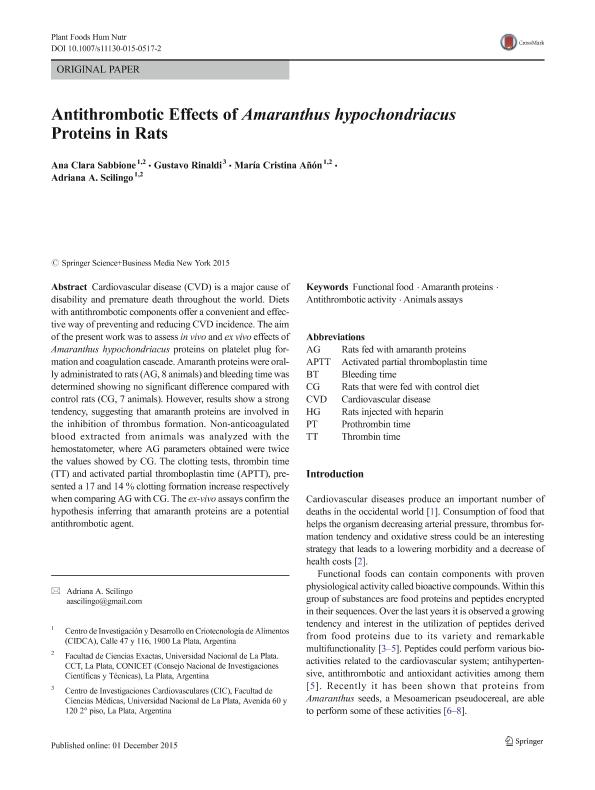Artículo
Antithrombotic Effects of Amaranthus hypochondriacus Proteins in Rats
Fecha de publicación:
03/2016
Editorial:
Springer
Revista:
Plant Foods for Human Nutrition
ISSN:
0921-9668
e-ISSN:
1573-9104
Idioma:
Inglés
Tipo de recurso:
Artículo publicado
Clasificación temática:
Resumen
Cardiovascular disease (CVD) is a major cause of disability and premature death throughout the world. Diets with antithrombotic components offer a convenient and effective way of preventing and reducing CVD incidence. The aim of the present work was to assess in vivo and ex vivo effects of Amaranthus hypochondriacus proteins on platelet plug formation and coagulation cascade. Amaranth proteins were orally administrated to rats (AG, 8 animals) and bleeding time was determined showing no significant difference compared with control rats (CG, 7 animals). However, results show a strong tendency, suggesting that amaranth proteins are involved in the inhibition of thrombus formation. Non-anticoagulated blood extracted from animals was analyzed with the hemostatometer, where AG parameters obtained were twice the values showed by CG. The clotting tests, thrombin time (TT) and activated partial thromboplastin time (APTT), presented a 17 and 14 % clotting formation increase respectively when comparing AG with CG. The ex-vivo assays confirm the hypothesis inferring that amaranth proteins are a potential antithrombotic agent.
Palabras clave:
Amaranth Proteins
,
Animals Assays
,
Antithrombotic Activity
,
Functional Food
Archivos asociados
Licencia
Identificadores
Colecciones
Articulos(CIDCA)
Articulos de CENTRO DE INV EN CRIOTECNOLOGIA DE ALIMENTOS (I)
Articulos de CENTRO DE INV EN CRIOTECNOLOGIA DE ALIMENTOS (I)
Citación
Sabbione, Ana Clara; Rinaldi, Gustavo Juan; Añon, Maria Cristina; Scilingo, Adriana Alicia; Antithrombotic Effects of Amaranthus hypochondriacus Proteins in Rats; Springer; Plant Foods for Human Nutrition; 71; 1; 3-2016; 19-27
Compartir
Altmétricas




